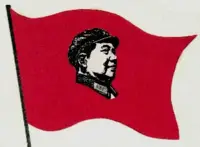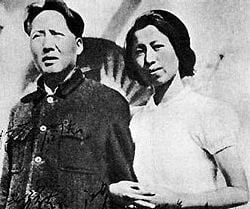Jiang Qing
- This is a Chinese name; the family name is Jiang.
Jiang Qing (Chinese: 江青), born Lǐ Shūméng, known under various other names, including the stage name Lan Ping (Chinese: 蓝苹), and commonly referred to as Madame Mao, (March 1914 – May 14, 1991), was the fourth wife of Chairman Mao Zedong of the People's Republic of China. Jiang Qing was most famous for leading the Cultural Revolution and forming the Gang of Four, and was a prominent leader along with colleague Lin Biao in state affairs. At the time of Mao's death Jiang and her proteges effectively controlled nearly all of China's institutions, including the media and most central government organs. As a result, Jiang is often put in the same ranks as Empress Wu Zetian and Empress Dowager Cixi. She was arrested in October 1976 by Hua Guofeng and his allies.
Early years
Jiang Qing was born as Lǐ Shūméng (Chinese: 李淑蒙) in Zhucheng (Chinese: 诸城), Shandong Province in 1914. Jiang Qing's father was called Li Dewen (Chinese: 李德文). Jiang Qing, first known as Li Yunhe (meaning "Crane in the Clouds"), grew up in the homes of her courtesan mother's rich lovers. She was an only child who was never doted upon and whose instincts were never curbed. In her early twenties, and after already exhausting two marriages, Jiang Qing went to university and studied literature and drama. Soon, Jiang Qing adopted the stage name "Lan Ping" (meaning "Blue Apple"), and became a professional actress. She appeared in numerous films and plays, including "A Doll's House," "Big Thunderstorm," "God of Liberty," "The Scenery of City," "Blood on Wolf Mountain", and "Old Mr. Wang". In Ibsen's play, "A Doll's House", Jiang Qing played the role of Nora, who, after being accused of talking like a child and not understanding the world she lives in, replies, "No I don't [understand the world]. But now I mean to go into that... I must find out which is right - the world or I." Being out of sorts with the world was also Jiang Qing's experience, whose early life was fraught with harsh realities. At 24, Jiang Qing, then known by yet another name - Lan Ping, left her life on the stage behind and went to the Chinese Communist headquarters in Yan'an, ostensibly to study Marxist-Leninist theory. There she met and became the fourth wife of Mao Zedong, who had just returned from the Long March.
Rise to power
| Part of a series on Maoism |
| Basic concepts |
| Marxism-Leninism |
| Anti-Revisionism |
| 3 Worlds Theory |
| Social-imperialism |
| Mass line |
| People's war |
| New Democracy |
| Prominent Maoists |
| Mao Zedong |
| Prachanda |
| Bob Avakian |
| Zhang Chunqiao |
| José María Sison |
| Abimael Guzmán |
| Charu Majumdar |
| Zhou Enlai |
| Jiang Qing |
| İbrahim Kaypakkaya |
| Maoist tendencies |
| Conference of M-L Parties and Organizations |
| Revolutionary Internationalist Movement |
| Related subjects |
| Communist Party of China |
| Cultural Revolution |
| Little Red Book |
| Naxalism
|
Madame Mao was involved with the Ministry of Culture in the 1950s and a leader in the 1966-76 Cultural Revolution. She emerged as a serious political figure when she criticized party leaders such as Liu Shaoqi, who favoured the introduction of piecework, greater wage differentials and measures that sought to undermine collective farms and factories. She became a member of the Politburo in 1969. She was appointed as the deputy director of the Cultural Revolution in 1966 and formed the Gang of Four with Zhang Chunqiao, Yao Wenyuan and Wang Hongwen. From that point on, she was one of the most powerful figures in China during Mao's last years and became a controversial figure.
During this period Mao Zedong galvanized students and young workers as his Red Guards to attack what he termed as revisionists in the party. Mao told them the revolution was in danger and that they must do all they could to stop the emergence of a privileged class in China. He argued this is what had happened in the Soviet Union under Joseph Stalin and Nikita Khrushchev.
Jiang Qing incited radical youths organized as Red Guards against other senior political leaders and government officials, including Liu Shaoqi, the President of the PRC at that time, and Deng Xiaoping, the Deputy Premier. Internally divided into factions both to the "left" and "right" of Jiang Qing and Mao, not all Red Guards were friendly to Jiang Qing.
The Cultural Revolution came to an end when Liu Shaoqi resigned from all his posts on 13th October 1968. Lin Biao now became Mao's designated successor. Chairman Mao now gave his support to the Gang of Four: Jiang Qing, Wang Hongwen, Yao Wenyuan and Zhang Chunqiao. These four radicals occupied powerful positions in the Politburo after the Tenth Party Congress of 1973.
Jiang Qing also directed operas and ballets with communist and revolutionary content as part of an effort to transform China's culture. The Eight model plays were allegedly created under her guidance. Critics say her influence on art was too restrictive. She replaced nearly all earlier works of art with revolutionary Maoist works.
According to Jung Chang's and Jon Halliday's biography of Mao Zedong, Jiang Qing's favorite hobbies included photography, playing cards, and watching foreign movies, especially Gone with the Wind. It also revealed that Mao's physician, Li Zhisui, had diagnosed her as a hypochondriac.
Jiang Qing first collaborated with then 2nd-in-charge Lin Biao, but after Lin's death in 1971, she turned against him publicly in the Criticize Lin, Criticize Confucius Campaign. She also spearheaded the campaign against Deng Xiaoping in the mid '70s (later saying that this was inspired by Mao). The Chinese public became intensely unhappy at this time and, rather than blaming Mao, chosing to blame a more accessible and easier target, Jiang Qing.
Downfall
On October 6, 1976 (very soon after the death of Mao Zedong on September 9, 1976), Jiang Qing and three others were arrested for attempting to seize power by setting up militia coups in Shanghai and Beijing. After her arrest, Jiang Qing was sent to the Qincheng Prison, and was held under detention for five years. Between 1981 and 1982, she was tried for crimes against innocent people and subverting the government. During her public trials at the "Special Court," Jiang Qing was the only member of the Gang of Four who bothered to argue on her behalf. The defense's argument was that she obeyed the orders of Chairman Mao Zedong at all times. Jiang Qing maintained that all she had done was to defend Chairman Mao. It was at this trial that Jiang Qing made the famous quote "I was Chairman Mao's dog. Whomever he asked me to bite, I bit"[1] . The official records of the trial have not yet been released. Jiang Qing was sentenced to death with a two-year reprieve in 1981, and the sentence was later commuted to life imprisonment. This was allegedly to "give her time to repent." While in prison, Jiang Qing was diagnosed with throat cancer. However, she refused an operation. Jiang Qing was released for medical reasons in 1991. At the hospital, Jiang Qing used the name Lǐ Rùnqīng (Chinese: 李润青). On May 14, 1991, Jiang Qing committed suicide by hanging herself in a bathroom of her hospital, aged 77.
Jiang Qing on trial
- Jiang Qing On Trial 1.jpg
- Jiang Qing On Trial 2.jpg
- Jiang Qing On Trial 3.jpg
- Jiang Qing On Trial 4.jpg
- Jiang Qing On Trial 5.jpg
- Jiang Qing On Trial 6.jpg
- Jiang Qing On Trial 7.jpg
- Jiang Qing On Trial 8.jpg
Names of Jiang Qing
- Birth name: Lǐ Shūméng (Chinese: 李淑蒙)
- Given name: Lǐ Jìnhái (Chinese: 李进孩)
- School name: Lǐ Yúnhè (Chinese: 李云鹤)
- Modified name: Lǐ Hè (Chinese: 李鹤)
- Stage name: Lán Píng (Chinese: 蓝苹)
- Commonly referred to as: Jiāng Qīng (Chinese: 江青)
- Pen name: Lǐ Jìn (Chinese: 李进)
- Last used name: Lǐ Rùnqīng (Chinese: 李润青)
ReferencesISBN links support NWE through referral fees
- ↑ Hutchings, Graham (2001). Modern China. Cambridge: MA: Harvard University Press. ISBN 0-674-01240-2.
- Jung Chang and Jon Halliday, Mao: The Unknown Story (London, 2005); Jonathan Cape, ISBN 0-679-42271-4
- Ross Terrill, The White-Boned Demon: A Biography of Madame Mao Zedong (New York: Morrow, 1984). ISBN 0-671-74484-4
- Roxane Witke, Comrade Chiang Ch'ing (Boston: Little Brown, 1977). ISBN 0-316-94900-0
- Jung Chang, Wild Swans: Three Daughters of China (London, 1990) ISBN 0-671-68546-5
- Li Zhisui,The Private Life of Chairman Mao (London: Random House, 1996) ISBN 0-09-9648814
See also
- Politics of the People's Republic of China
- Becoming Madame Mao
Credits
New World Encyclopedia writers and editors rewrote and completed the Wikipedia article in accordance with New World Encyclopedia standards. This article abides by terms of the Creative Commons CC-by-sa 3.0 License (CC-by-sa), which may be used and disseminated with proper attribution. Credit is due under the terms of this license that can reference both the New World Encyclopedia contributors and the selfless volunteer contributors of the Wikimedia Foundation. To cite this article click here for a list of acceptable citing formats.The history of earlier contributions by wikipedians is accessible to researchers here:
The history of this article since it was imported to New World Encyclopedia:
Note: Some restrictions may apply to use of individual images which are separately licensed.

